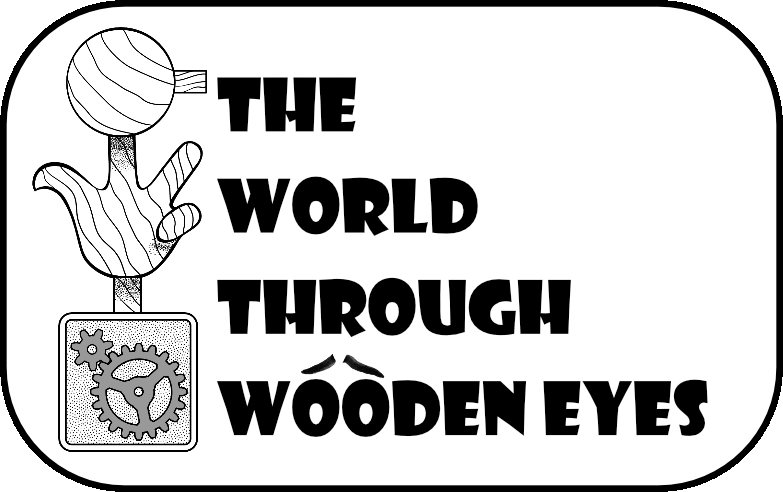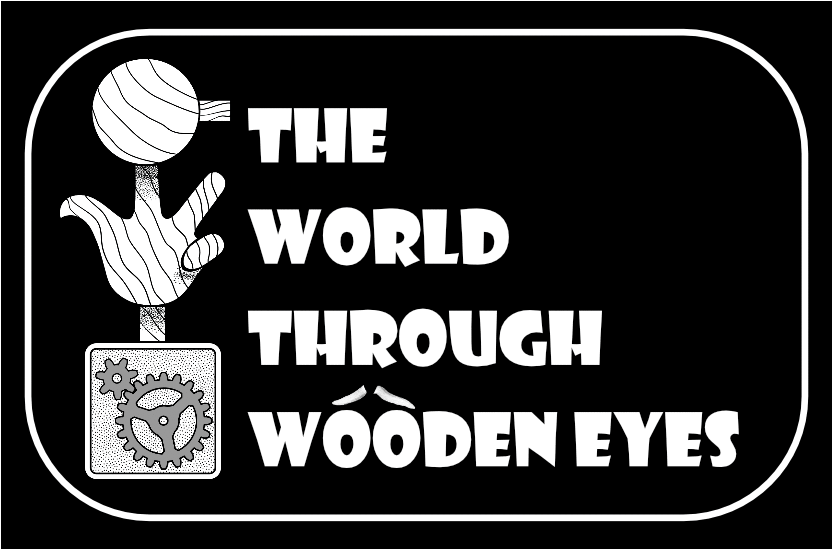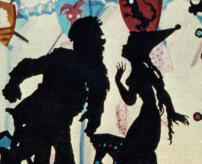NAVIGATION
SOCIAL
CONTACT
e-mail: info@theworldthroughwoodeneyes.co.uk

Lotte
was
like
a
homely
great
aunt
who
conjured
up
a
web
of
silent
but
magical
animated
images
with
a
tiny
pair
of
scissors.
Her
consummate
skill
in
manipulating
delicate
figures
cut
from
black
paper,
cereal
packets,
and
pieces
of
thin
lead,
in
frames
containing
complex
choreographic
movements,
was
due
to
her
extraordinary
sense
of
musicality,
and
her
unique
knowledge
of
the
theatrical
movement of everything that walked, crawled, flew swam and grew.
Lotte
adored
actors
and
dancers,
particularly
dancers
with
whom
she
spent
many
hours
watching
them
in
their
performances;
she
even
had
access
to
the
private
box
of
Colonel
De
Basils
for
the
performances
of
his
Ballet
Russe
De
Monte
Carlo.
At
a
young
age
she
entered
the
Theatre
School
of
Max
Reinhardt,
but
only
wanted
to
join
the
classes
for
the
boys,
because
they
did
gymnastics.
It
was
in
Reinhardt’s
school
that
she
developed
her
paper
cutting
skills,
producing
tiny
portrait figures with great accuracy.
Her
unique
skills
attracted
many
artists,
actors,
dancers
and
film-makers
including
Gordon
Craig,
Charles
Chaplin,
Robert
Helpman,
and
many
other
leading
dancers
and
actors.
I
frequently
went
to
visit
Lotte
in
her
flat
with
a
lounge,
a
small
kitchen
area,
and
a
room
that
contained
her
multi-plane
trick
table,
on
which
most
of
her
films
were
made.
She
loved
good
wine
and
cheese,
and
on
my
visits
to
see
her
I
collected
these
delights
for
her.
She
would
prepare
a
light
lunch
whilst
I
was
invited
to
browse
the
piles
of
books
that
stood
about
the
lounge.
Many
of
these
books
were
given
to
her,
and
inscribed
by
many
of
the
legendary
personalities that clearly adored her and her work.
Lotte
was
a
gold
mine
of
fascinating
anecdotes
related
to
her
endless
exploits,
many
of
them
re-told
with
a
touch
of
her
wicked
sense
of
humour.
She
was
once
invited
to
meet
Gordon
Craig
at
a
venue
outside
Paris.
He
arrived
wearing
his
large
brimmed
hat,
and
carrying
a
large
book
about
Isadora
Duncan,
and
in
between
each
page
of
the
book
Craig
had
inserted
many
sheets
of
paper
covered
with
his
notes,
and
said
to
Lotte,
‘this
is
the
book
as
written,
the
inserted
pages
are
what
‘really’
happened’.
Lotte
met
with
Craig
on
a
number
of
occasions
and
described him as a ‘very nice man.’
Lotte
also
related
a
story
of
her
early
work
in
film
where
the
film
maker
Paul
Wegener
had
extreme
difficulties
making
The
Pied
Piper
of
Hameln’,
mainly
due
to
the
fact
that
the
live
rats
wouldn’t
behave
as
live
actors
would
be
expected
to.
Lotte
offered
to
undertake
an alternative solution. I heard three alternatives, one using silhouettes, the other using guinea pigs with added tails, finally wooden rats.
I
have
in
my
collection
many
letters
written
by
Lotte
from
the
1920s
onwards
to
Constance,
and
Ifan
Kyrle
Fletcher,
an
antiquarian
book
and
print
seller
who
dealt
with
many
actors,
dancers
and
designers.
The
letters
are
often
sad
descriptions
of
hers
and
Carl
Koch’s
struggle
to
survive
ill
health,
frequently
with
very
little
money,
sometimes
borrowing
money
from
the
Fletcher’s, and the sale of her work.
Quite
late
on
in
her
life
I
talked
to
her
on
the
patio
of
Jan
and
Ann
Hogarth’s
house
in
Egham.
I
asked
her
what
she
was
‘up
to’,
her
reply
‘nothing,
I
am
a
lazy
cow
now.’
After
some
pressure
she
told
me
that
she
had
just
re-coloured
her
classic
film
‘Prince
Achmed’!
I
then
asked
her
if
there
was
anything
she
would
like
to
do,
her
reply,
‘my
dream
is
to
illustrate
the
opera’s of Mozart’, this she finally did, and the result a wonderful large size book of great beauty, and full of her exquisite silhouettes, full of energy and character
I
first
met
Lotte
in
Munich
in
the
courtyard
of
the
Kunstler
Haus.
She
was
sitting
talking
with
Lenora
Gustavna
Shpet,
the
dramaturg
in
the
Moscow
State
Puppet
Theatre
of
Sergei
Obraztsov;
she
also
had
links
with
Meyerhold
and
Mayakovsky.
Lenora
called
me
over,
sat
me
between
them,
introduced
me
to
Lotte,
and
both
of
them
plied
me
with
gems
of
wisdom
related
to
the
various
disciplines
of
the
creative
artist,
how
I
valued
these.
This
event
took
place
on
several
other
occasions
until
we
left
Munich.
Shpet’s
niece
was
the
great
Bolshoi
ballet
star, Nikitina Maximova trained by the legendary Ulanova.
Over
the
years
Lotte
frequently
used
her
live
theatrical
skills.
In
pantomimes
at
The
Coventry
Theatre,
Coventry,
where
she
collaborated
with
Pauline
Grant
the
dancer,
choreographer,
and
producer
in
her
famous
pantomimes
at
The
Coventry
Theatre.
One
magical
effect
was
her
creation
of
the
journey
of
the
frog
down
the
well
in
‘The
Frog
Prince’.
She
created
a
wonderful
animated film sequence that was projected on a vast screen during the performance.
Later
in
her
life
she
was
re-discovered
and
on
a
number
of
occasions
she
made
journey
to
Canada
and
The
Canadian
Film
Foundation,
there
she
undertook
master
classes
and
film
projects,
One
of
them
‘Aucassan
and
Nicolette’
one
of
her
favourite
stories.
She
became
very
frail
and
found
it
difficult
to
walk
at
times.
Sitting
with
her
in
her
flat,
her
efforts
to
rise
from
her favourite armchair were frequently accompanied by the sound of her slapping her thighs and shouting, ‘work, work, work legs’.
On
a
number
of
occasions
Lotte
came
to
Birmingham
to
give
talks
and
demonstrations,
and
show
her
favourite
films
in
my
theatre.
She
loved
this
annual
event.
She
adored
children,
and
they
in
their
turn
loved
her
kind,
gentle
and
somewhat
eccentric
personality.
Between
each
film
she
would
answer
questions
and
ask
the
children
what
their
favourite
animals
were,
immediately
she
would
take
a
piece
of
black
paper,
and
with
her
magic
scissors,
she
would
deftly
snip
them
out,
handing
them
over
with
great
love
and
thanks
for
giving
her
so
many
joyous experiences just being with them.
John Blundall
Lotte Reiniger

CONTACT
e-mail: info@theworldthroughwoodeneyes.co.uk
SOCIAL

Lotte
was
like
a
homely
great
aunt
who
conjured
up
a
web
of
silent
but
magical
animated
images
with
a
tiny
pair
of
scissors.
Her
consummate
skill
in
manipulating
delicate
figures
cut
from
black
paper,
cereal
packets,
and
pieces
of
thin
lead,
in
frames
containing
complex
choreographic
movements,
was
due
to
her
extraordinary
sense
of
musicality,
and
her
unique
knowledge
of
the
theatrical
movement
of
everything
that
walked,
crawled,
flew swam and grew.
Lotte
adored
actors
and
dancers,
particularly
dancers
with
whom
she
spent
many
hours
watching
them
in
their
performances;
she
even
had
access
to
the
private
box
of
Colonel
De
Basils
for
the
performances
of
his
Ballet
Russe
De
Monte
Carlo.
At
a
young
age
she
entered
the
Theatre
School
of
Max
Reinhardt,
but
only
wanted
to
join
the
classes
for
the
boys,
because
they
did
gymnastics.
It
was
in
Reinhardt’s
school
that
she
developed
her
paper
cutting
skills,
producing
tiny
portrait figures with great accuracy.
Her
unique
skills
attracted
many
artists,
actors,
dancers
and
film-makers
including
Gordon
Craig,
Charles
Chaplin,
Robert
Helpman,
and
many
other
leading
dancers
and
actors.
I
frequently
went
to
visit
Lotte
in
her
flat
with
a
lounge,
a
small
kitchen
area,
and
a
room
that
contained
her
multi-plane
trick
table,
on
which
most
of
her
films
were
made.
She
loved
good
wine
and
cheese,
and
on
my
visits
to
see
her
I
collected
these
delights
for
her.
She
would
prepare
a
light
lunch
whilst
I
was
invited
to
browse
the
piles
of
books
that
stood
about
the
lounge.
Many
of
these
books
were
given
to
her,
and
inscribed
by
many
of
the
legendary
personalities
that
clearly
adored
her
and her work.
Lotte
was
a
gold
mine
of
fascinating
anecdotes
related
to
her
endless
exploits,
many
of
them
re-told
with
a
touch
of
her
wicked
sense
of
humour.
She
was
once
invited
to
meet
Gordon
Craig
at
a
venue
outside
Paris.
He
arrived
wearing
his
large
brimmed
hat,
and
carrying
a
large
book
about
Isadora
Duncan,
and
in
between
each
page
of
the
book
Craig
had
inserted
many
sheets
of
paper
covered
with
his
notes,
and
said
to
Lotte,
‘this
is
the
book
as
written,
the
inserted
pages
are
what
‘really’
happened’.
Lotte
met
with
Craig
on
a
number
of
occasions
and
described him as a ‘very nice man.’
Lotte
also
related
a
story
of
her
early
work
in
film
where
the
film
maker
Paul
Wegener
had
extreme
difficulties
making
The
Pied
Piper
of
Hameln’,
mainly
due
to
the
fact
that
the
live
rats
wouldn’t
behave
as
live
actors
would
be
expected
to.
Lotte
offered
to
undertake
an
alternative
solution.
I
heard
three
alternatives,
one
using
silhouettes,
the
other
using
guinea
pigs
with added tails, finally wooden rats.
I
have
in
my
collection
many
letters
written
by
Lotte
from
the
1920s
onwards
to
Constance,
and
Ifan
Kyrle
Fletcher,
an
antiquarian
book
and
print
seller
who
dealt
with
many
actors,
dancers
and
designers.
The
letters
are
often
sad
descriptions
of
hers
and
Carl
Koch’s
struggle
to
survive
ill
health,
frequently
with
very
little
money,
sometimes
borrowing
money
from
the
Fletcher’s, and the sale of her work.
Quite
late
on
in
her
life
I
talked
to
her
on
the
patio
of
Jan
and
Ann
Hogarth’s
house
in
Egham.
I
asked
her
what
she
was
‘up
to’,
her
reply
‘nothing,
I
am
a
lazy
cow
now.’
After
some
pressure
she
told
me
that
she
had
just
re-coloured
her
classic
film
‘Prince
Achmed’!
I
then
asked
her
if
there
was
anything
she
would
like
to
do,
her
reply,
‘my
dream
is
to
illustrate
the
opera’s
of
Mozart’,
this
she
finally
did,
and
the
result
a
wonderful
large
size
book
of
great
beauty,
and
full
of
her
exquisite silhouettes, full of energy and character
I
first
met
Lotte
in
Munich
in
the
courtyard
of
the
Kunstler
Haus.
She
was
sitting
talking
with
Lenora
Gustavna
Shpet,
the
dramaturg
in
the
Moscow
State
Puppet
Theatre
of
Sergei
Obraztsov;
she
also
had
links
with
Meyerhold
and
Mayakovsky.
Lenora
called
me
over,
sat
me
between
them,
introduced
me
to
Lotte,
and
both
of
them
plied
me
with
gems
of
wisdom
related
to
the
various
disciplines
of
the
creative
artist,
how
I
valued
these.
This
event
took
place
on
several
other
occasions
until
we
left
Munich.
Shpet’s
niece
was
the
great
Bolshoi
ballet
star,
Nikitina Maximova trained by the legendary Ulanova.
Over
the
years
Lotte
frequently
used
her
live
theatrical
skills.
In
pantomimes
at
The
Coventry
Theatre,
Coventry,
where
she
collaborated
with
Pauline
Grant
the
dancer,
choreographer,
and
producer
in
her
famous
pantomimes
at
The
Coventry
Theatre.
One
magical
effect
was
her
creation
of
the
journey
of
the
frog
down
the
well
in
‘The
Frog
Prince’.
She
created
a
wonderful
animated
film
sequence
that
was
projected
on
a
vast
screen
during the performance.
Later
in
her
life
she
was
re-discovered
and
on
a
number
of
occasions
she
made
journey
to
Canada
and
The
Canadian
Film
Foundation,
there
she
undertook
master
classes
and
film
projects,
One
of
them
‘Aucassan
and
Nicolette’
one
of
her
favourite
stories.
She
became
very
frail
and
found
it
difficult
to
walk
at
times.
Sitting
with
her
in
her
flat,
her
efforts
to
rise
from
her
favourite
armchair
were
frequently
accompanied
by
the
sound
of
her
slapping
her
thighs
and
shouting,
‘work,
work,
work legs’.
On
a
number
of
occasions
Lotte
came
to
Birmingham
to
give
talks
and
demonstrations,
and
show
her
favourite
films
in
my
theatre.
She
loved
this
annual
event.
She
adored
children,
and
they
in
their
turn
loved
her
kind,
gentle
and
somewhat
eccentric
personality.
Between
each
film
she
would
answer
questions
and
ask
the
children
what
their
favourite
animals
were,
immediately
she
would
take
a
piece
of
black
paper,
and
with
her
magic
scissors,
she
would
deftly
snip
them
out,
handing
them
over
with
great
love
and
thanks
for
giving
her
so
many joyous experiences just being with them.
John Blundall.
Lotte Reiniger








































